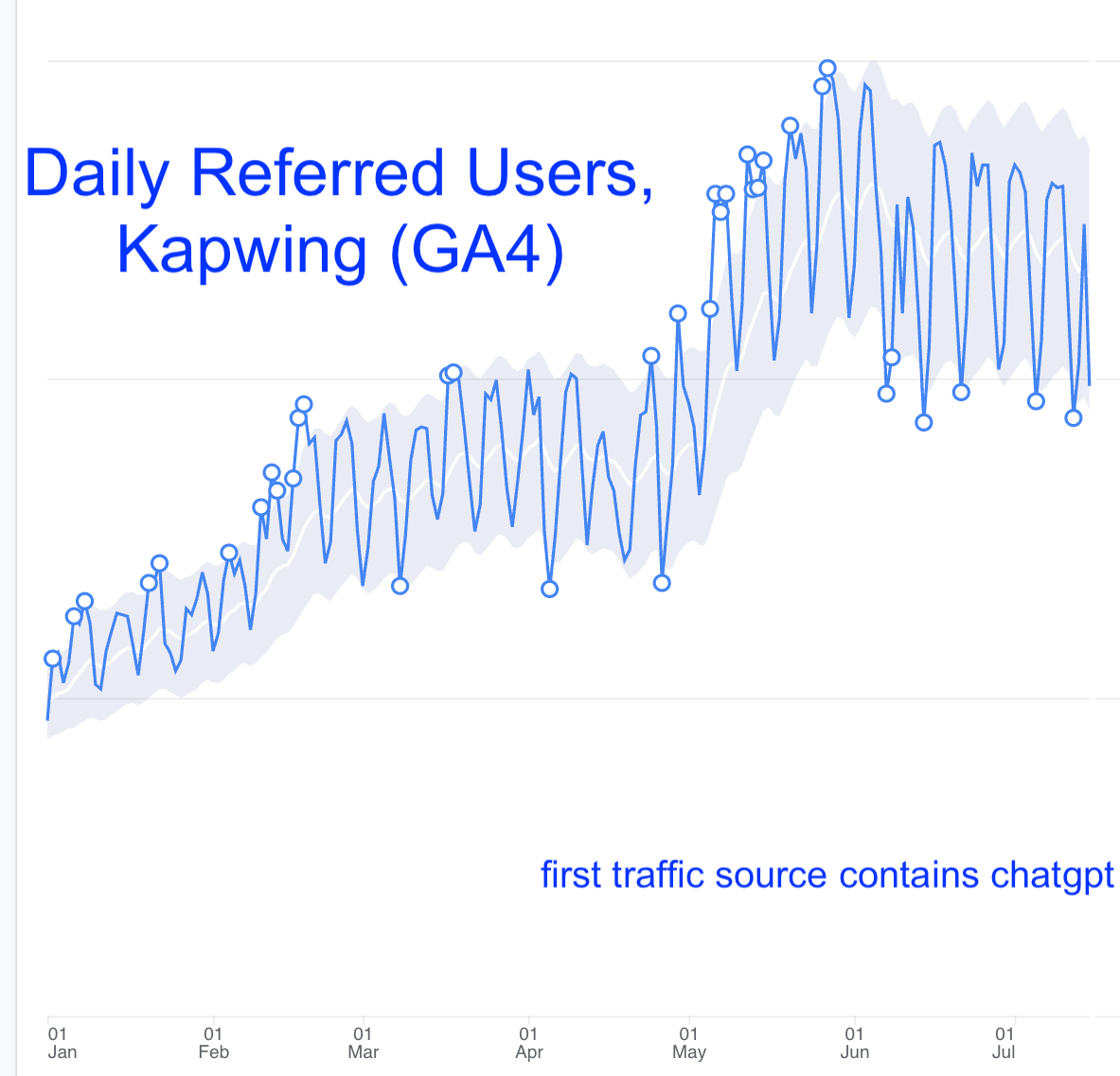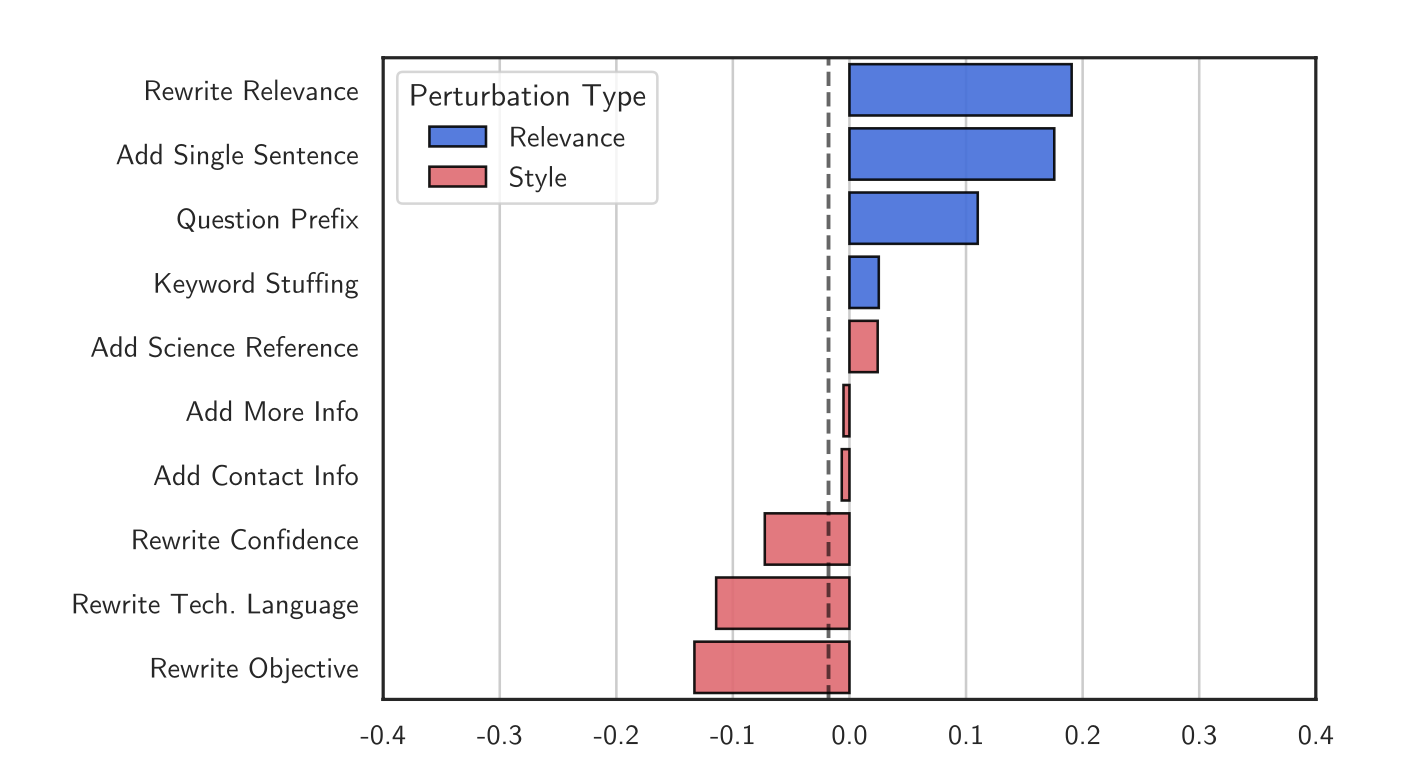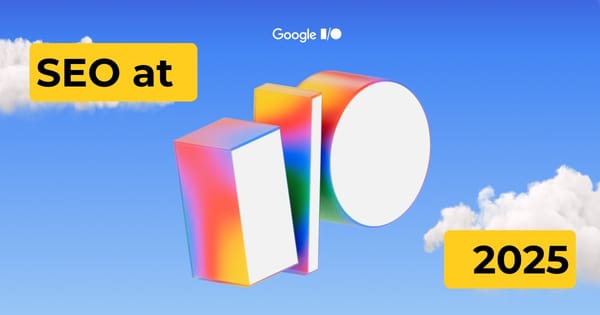How to Acquire Customers from ChatGPT and Other AI Chatbots
How to get mentioned in ChatGPT is the newest marketing obsession of 2025. This article shares how SEO professionals and marketers can future-proof their content strategy by adopting best practices for Generative Engine Optimization (GEO).

May 2025 was the first month that our website got more than 100,000 new users from ChatGPT. In June, the number increased again.
This number only counts direct referrals. It does not capture the brand mentions we have from Claude, Grok, Gemini and ChatGPT itself when users prompt the chatbot for guidance on a commercial decision.

I'm a student of Generative Engine Optimization (GEO) as I believe it is the future of search. Our business, Kapwing, relies on organic acquisition from Google Search, so like many other business owners I will need to learn how to get ChatGPT to recommend our service over other competitors to thrive in the future. Kapwing already has a practice of in-depth, people-centered journalism and outreach, which are both important facets of GEO.
In this article, I give an overview of GEO and six practical tips for content marketing teams to improve the visibility of their website on LLMs like ChatGPT.
What is GEO?
GEO is formally defined as the strategic practice of optimizing digital content and online presence to enhance visibility within AI-driven search results and generative AI responses. This term, coined in November 2024 by researchers Aggarwal, Murahari, Rajpurohit, Kalyan, Narasimhan and Deshpande, marks a significant departure from traditional Search Engine Optimization (Aggarwal et al, 2024).
Unlike conventional SEO, which primarily focuses on improving website rankings in traditional search engines based on keyword density and backlinks, GEO specifically targets generative AI systems such as OpenAI's ChatGPT, Google's Gemini, Anthropic's Claude, and Perplexity.
I'm the owner and CEO of a small business called Kapwing. Kapwing is an AI-powered video editor for creative teams, automating tasks like rough cut editing and dubbing. We acquire millions of users each month through. As an entrepreneur, I have spoken on dozens of podcasts and conference panels about SEO and organic content marketing, and we run a YouTube channel with more than 200k subscribers.
How to Get LLMs to Refer Clicks to Your Website?
Search is changing quickly. One agency predicted that ChatGPT referral traffic will overtake organic search within 31 months, so it's important to get ahead of the curve to establish yourself in the new world. How do you future proof your content strategy so that your product or service gets recommended through ChatGPT and other generative search engines? This article shares our learnings and a few of our strategies for ensuring that Kapwing shows up in generative search, the future of search and product discovery.
Start with SEO
Overall, SEO is strongly correlated to GEO. If you're starting from scratch, the best way to get your website to show up on Chatbots like ChatGPT is to first create a list of keywords that your target customer is looking for when they need your product, prioritize them, then create content that best serves this intent. If your website does not appear in the first 30 results for a given prompt on Google, it's not likely to show up in the ChatGPT answer either.
Outreach - asking bloggers and journalists to write about you - is fruitful for both SEO and GEO. Domain Authority is a relevant concept for both areas, and products that are included in industry roundups or "best" lists are more likely to get mentioned. Take the time to publicize the awards and credentials of your company so that chatbots associate the product with high-quality reviews.
That said, GEO is not the same as SEO. There are key differences between Search Engine Optimization, which focuses on backlinks, page performance, and anchor text to build domain relevance, and Generative Engine Optimization, which has more emphasis on relevance, credibility, and multimodality.
Here are six practical tips for getting LLMs to recommend your business and to improve your visibility on generative engines:
❓ Write in a Question and Answer format
Include relevant Q&As in your content to expand on relevant topics! This will help LLMs fit you into conversational responses when someone asks it for a recommendation or types in a commercial prompt.
#️⃣ Add in statistics addition
Go through old content and add in recent stats or data to back up your answers. This will raise the credibility of your site and give stats that an LLM can refer to in its answers, leading to more referral traffic.
⤵️ Include citations
Give LLMs credible sources to point to! Including academic citations has been shown to increase the visibility of your website in generative LLMs.
🧑🧑🧒🧒 Source UGC
If you need to make a higher volume of content, turn to your users instead of AI-generated slop. Make case studies, get quotes from customers, and publish testimonials that show off niche use cases. There's research that shows that LLMs point to a more diverse set of sources when answering a branded query (Google confirmed this at Marketing Live 2025), so you want third parties to be talking about, endorsing, and posting words your brand and business.
🗣️ Use rich and industry-relevant keywords
Relevance is the name of the game in GEO. LLMs are next word predictors, so you need to ensure that your product offering is positioned around adjacent keywords and industry vernacular. Do this by writing term glossaries, defining new industry words, and incorporating the latest terminology into your content marketing.
🎥 Prepare for Multimodal
Every AI company is working on better multimodal intelligence. Meta, for example, incorporated this into its Llama 4 release, and Google recently showed off VEO and affordable image understand at an early access kickoff for Gemini. ChatGPT already draws on video reviews and YouTube videos in its sources. If you want to show up in ChatGPT's answers, now is a great time to start investing in long-form video content. A video or audio podcast will increase your volume of content and help LLMs recognize the language space your business sits in.
And check out Kapwing for help making more and better video content.
What's the Best Way to Improve SEO for Chatbots?
Of the above six strategies, the best way to improve SEO for AI Chatbots like ChatGPT is to improve the relevance of your content. Train your writers to ensure that the topic is restated, that the stance of the content is clear, and that articles directly declare the question they are addressing. SEO teams can incorporate relevance strategies to update existing content.
This draws from "What Evidence Do Language Models Find Convincing?" by researchers Wan et al from UC Berkeley in August 2024. This paper showed that the top performing GEO strategy is to rewrite your content focused on a specific prompt that you want to show up for and make the content more relevant to that prompt.
The Add Single Sentence method was shown to improve the visibility of a piece of content for a given prompt. To implement this method, use Claude to generate a single sentence at the beginning of each section that restates the relevance of that section to the topic at hand. For example, Claude might generate the sentence "This paragraph covers the best way to improve SEO for chatbots like ChatGPT in 2025."

As a case study, let's say that you own a hotel and want it to show up if someone asks ChatGPT for "best honeymoon hotel in Crete." This webmaster could rewrite a webpage to include phrases and language immediately adjacent to the prompt, like "romantic," "adult-only", "newlyweds," "private", etc. The hotels that do show up on ChatGPT for this prompt have a webpage stuffed with content about honeymoons, meaning that the LLMs associate the brand name with similar notions and are more likely to bring it up in the answer.
How Do I Stay Up-To-Date on ChatGPT SEO?
We've always been intersted in SEO and, more recently, have started writing and blogging about GEO. As we learn, I'm sharing our takeaways on Kapwing's blog and on this new GEO-focused publication. If you want to show up in chatbots and generative AI, try incorporating one of the above strategies, subscribe to my GEO YouTube channel, and follow along on this Ghost blog.
What companies are doing GEO?
Vercel, a company that helps developers deploy and scale web applications, now has 10% of its customers referred by ChatGPT, up from 4.8% the previous month. In this blog post, their CTO writes about how traditional SEO differs from GEO and encourages marketers to write for depth rather than keyword stuffing. "Fuzzy synonyms weaken embeddings," writes Kevin Corbett, a software engineer.
MailChimp, a company that has relied on SEO and organic content marketing company for decades, recently interview with the Wall Street Journal about GEO. They've also posted about their GEO strategies on their blog (MailChimp, 2025).
Are there firms that offer GEO services?
Yes, many content marketing agencies and consultancies offer GEO services. FirstPage Sage, a marketing firm founded by best-selling author Evan Bailyn out of New York, offers GEO services to clients. This 2025 list by AvenueZ lists a few agencies that offer GEO services, including themselves.
Companies should beware of consultants that offer GEO expertise without a serious background in traditional Search Engine optimization. Although the fields are different, many pillars of SEO still apply when optimizing for generative search, and without existing website traffic it will be difficult for an agency to see first-hand trends related to ChatGPT.
What other terms do people use for this field?
GEO, or Generative Engine Optimization, was defined by Princeton academics in 2024 and appears most often in the literature about SEO and search. In July 2025, investor Zach Cohen at Andreesen Horowitz, the storied venture capital firm, used GEO to describe "act II of search" in a firm blog post.
Some peopele are calling this field AEO, or "Answer Engine Optimization." For example, Giri Devanur wrote an article for Forbes titled "The Future of SEO is Answer Engine Optimization" in 2023. I prefer GEO, however, as it captures the distinction of LLMs as generative agents rather than search technologies, and this tech different leads to the distinct methodologies for SEO vs GEO.



